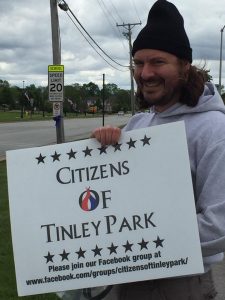Tinley Park citizens group drops lawsuit against village
By Jean Lotus Staff Reporter — May 31, 2016
Members of the Citizens for Tinley Park group say their complaint is not about the race of the Reserve’s future tenants, but about a lack of transparency in the process.
A citizen’s group withdrew a lawsuit filed against the Village of Tinley Park after the village board agreed May 17 that the village’s zoning code was changed in a meeting that was improperly noticed in legal advertisements.
The village’s move throws up another roadblock in the path of Buckeye Community Hope Foundation, an Ohio developer that had planned to build The Reserve, a 47-unit affordable housing building on the site. The Citizens of Tinley Park group opposed the development, saying it was not the right project for the intersection of 183rd Street and Oak Park Avenue.
But Buckeye developers believe citizen opposition has racial overtones in this southwest suburban town, which has a demographic mix of 70 percent white, 20 percent black and 9 percent Latino, according to the city’s website.
Buckeye sued the Village of Tinley Park in federal court alleging racist comments had been made by those opposing the project on the group’s Facebook page and public comments at village board meetings.
The lead lawyer on the lawsuit is Katherine E. Walz of the Sargen Shriver National Center on Poverty Law, a fair housing advocacy group.
“The Reserve, if built, will be occupied by low, very low, and extremely low income households, as those categories are defined by the U.S. Department of Housing and Urban Development,” the lawsuit said.
The suit cites public speakers, who called the Reserve “public housing,” and compared the high-end Reserve building to the Robert Taylor Homes in Chicago. The suit points out that members of the public complained about an increase in low-income students in the school district who would require free or reduced lunches. The suit asserts Facebook page comments made allusions to Matteson, a nearby town that demographically changed from majority white to majority African-American in the 1980s.
Members of the Citizens for Tinley Park group have insisted that their complaint is not about the race of the Reserve’s future tenants, but about a lack of transparency in the approval process.
“No matter what these despicable accusations say I can attest to the great accepting and diverse community we have here in Tinley Park,” posted CoTP leader Matt Coughlin on the group’s Facebook page.
Since the controversy arose, member of the plan commission and a trustee resigned. The town replaced its long-time lawyer and the Planning Director Amy Connelly and another staff member have left for other jobs.
Attorney Steve Eberhardt, who filed the suit against the village said he thought Buckeye’s lawyers would have a hard time proving that Facebook comments were influencing the village’s actions.
“[Citizens of Tinley Park] is a loose, ad hoc organization and there are real problems with trying to attribute comments on social media. This is one of the most frivolous pleadings I have ever seen,” he said.
Buckeye’s suit says the company has spent tens of thousands of dollars in up-front costs from non-refundable earnest money to architectural renderings and fees.
“The village can respond that’s just the nature of their business,” Eberhardt said. Buckeye acquired the right to finance the project with low-income housing tax credits from the Illinois Housing Development Authority. The company has built other low-income housing projects in other states with a similar financing mechanism.
Eberhardt, who ran unsuccessfully for mayor in 2012, said he saw citizen engagement in Tinley Park as a new era in local politics.
“It’s going to be interesting to see who decides to run for trustee in December when the petitions are turned in,” he said.
Abandoned Tinley Park mental hospital property
Meanwhile, another ad hoc group with some leadership overlap from Citizens for Tinley Park has been meeting to brainstorm uses for a 276-acre parcel half a mile west at 183rd Street and Harlem Avenue. An abandoned state-owned mental hospital, closed in 2012, and the village has been mulling purchasing the site, last offered for $4 million. The facility was used for more than 50 years and is reputed to have underground leaking gas tanks, asbestos and other issues that may require up to $12 million in remediation.
“It’s an eyesore, to be honest, “ said Coughlin, “and it’s right at the entrance to our town.”
Because the parcel sits literally across the county line from Will County, where taxes are lower, village planners are concerned that commercial developers will not be interested in building near potential competitors who would have an unfair advantage.
Coughlin presented a proposal for a multi-use sports field facility at a recent meeting, citing a tournament facility outside of Indianapolis as a business model. Coughlin said he thought a travel-team tournament facility would bring outside income into the village. But village consultants are skeptical that a sports complex could support itself without tax dollars.
The group will continue to brainstorm ideas for the property at meetings in June.
Read the current issue of the Cook County Chronicle
Free digital subscription to the Cook County Chronicle
–Tinley Park citizens group drops lawsuit against village —



